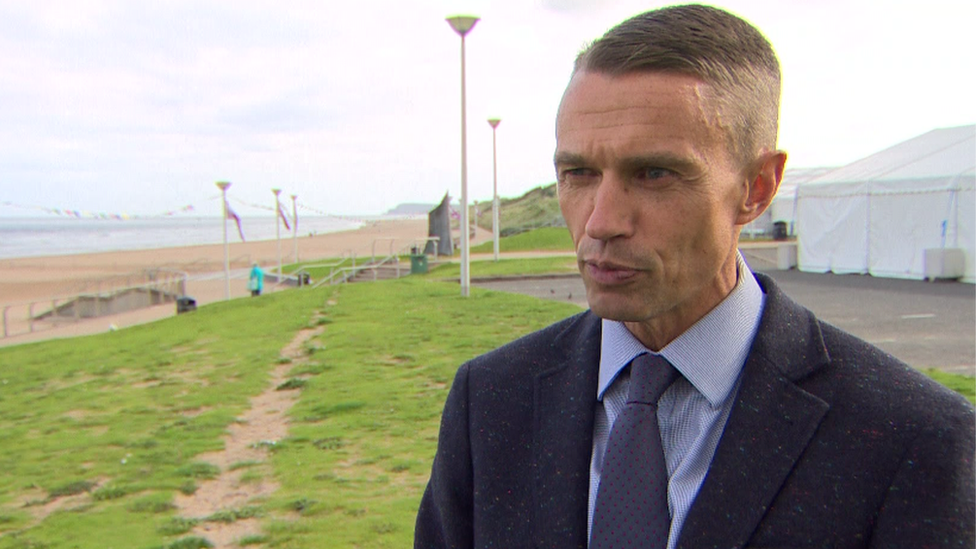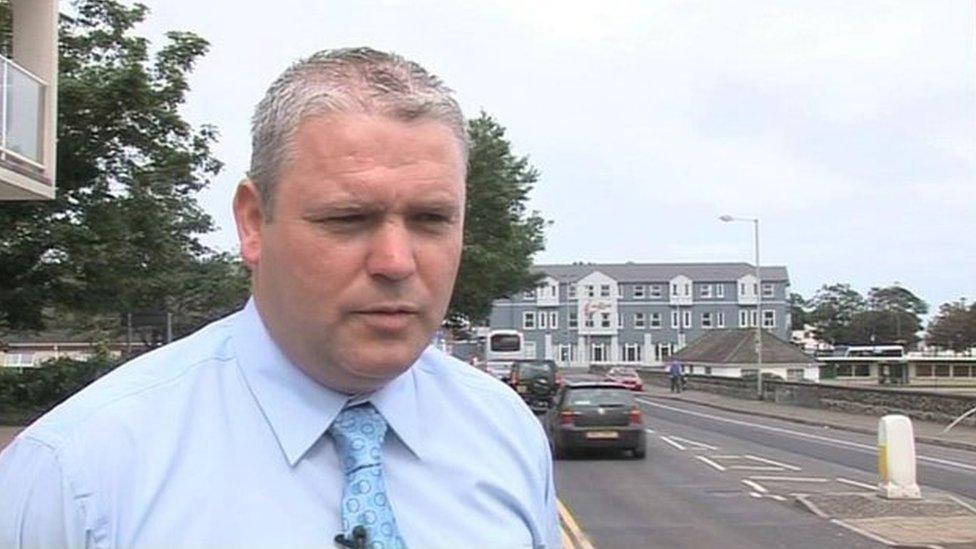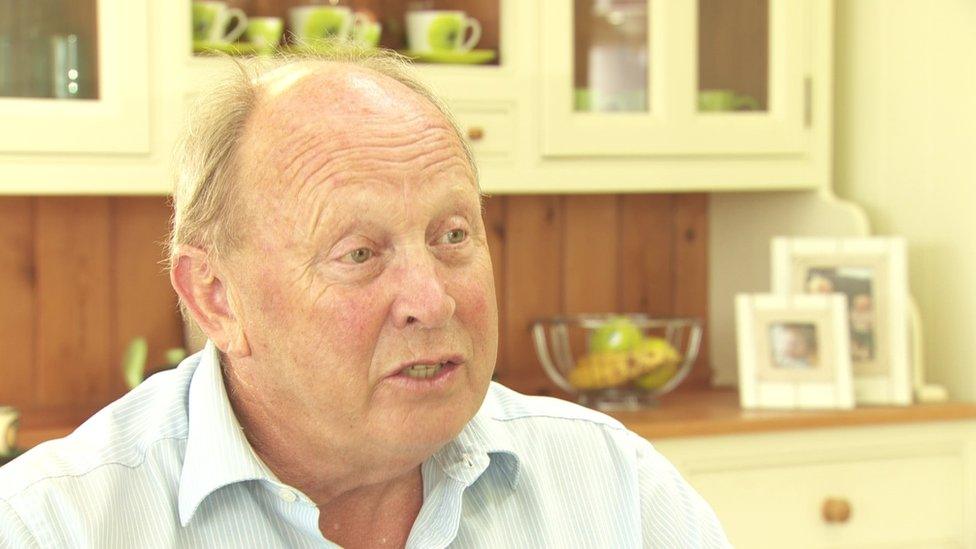Causeway Coast and Glens council boss 'responsible' for £1 right of way
- Published

David Jackson told investigators he had no knowledge the land had been sold for £1
A council chief executive was "ultimately responsible" for the granting of a right of way over public land in Portstewart to a hotel developer for £1, an independent investigation has found.
David Jackson, the CEO of Causeway Coast and Glens Council, had 15 complaints upheld against him.
They centred on his conduct over a planning application for a £20m hotel.
The development's planning permission was quashed after a legal challenge.
The legal challenge against the hotel and spa resort was brought by the North Antrim assembly member Jim Allister.
During the judicial review there was disagreement over what the right of way was worth, with one valuer who acted for Mr Allister placing it at £800,000.
But an independent expert agreed with a backdated valuation obtained by the council, which effectively indicated the right of way was of no real value.
Mr Allister subsequently made 18 complaints to the council about the conduct of its chief executive, some of which are overlapping.
'No knowledge land had been sold'
Investigators found some of Mr Jackson's actions had "not met" with the Code of Conduct for Local Government Employees.
Among the complaints made by Mr Allister, which have been upheld, include allegations that:
Mr Jackson was ultimately responsible for a process which saw a right of way granted to the developer for £1 before a valuation was obtained paying no regard to the duty to secure the best price that could be reasonably obtained
He actively facilitated the granting of the right of way with a request to council officials to turn it around quickly
He made written comments to council officials, including planning officers, supporting approval of the application
He breached good practice and protocol by continuing interaction with the developer after the planning application had been submitted
He failed to accurately answer questions posed to him by a councillor who was investigating whether the council had met its duty to ratepayers
In defending his actions, Mr Jackson said he had no knowledge that the land in question had been sold for £1.
He told investigators there was a need to weigh up the cost of the land against the lack of hotel accommodation, jobs, rates and value to the area.
The report noted that Mr Jackson accepted that in hindsight the council should have at least recovered its costs.
'Serious indictment'
Mr Jackson told investigators that "collectively" he had not been involved in the right of way process and that another colleague had been involved.
The report added that Mr Jackson said the council was responsible for the planning decision with his involvement "by exception".
Investigators said he did however confirm he was accountable for the proper use of public resources as chief executive and that "ultimately the buck stops with him".
The complaints made by Jim Allister, who was acting as a private citizen, were investigated independently by the external HR consultancy firm Happy Raspberry.

North Antrim MLA Jim Allister, acting as a private citizen, made the complaints against Mr Jackson
A report into the investigation was first considered by councillors at a committee meeting on 25 August.
Mr Allister said that the "openness and transparency" from the council "leaves a lot to be desired".
"If 15 of 18 complaints have been upheld then that strikes me as a serious situation that the council must deal with," he said.
"Some of those findings are quite serious complaints about a chief executive who did not conduct himself in terms of FOI as he ought, who did not conduct himself in the council in terms of parting with a council asset for £1 so that he could help assemble, for a planning applicant, the site which was necessary for the planning application.
"I think they all cumulatively amount to a very serious indictment of a chief executive," he added.
No chief executive disciplinary process
Other allegations in Mr Allister's complaint were based on tape recordings made by the independent councillor Padraig McShane in conversations with the council solicitor.
The judge accepted transcripts of these conversations as evidence in the judicial review case.
Based on these recordings, investigators also upheld allegations that Mr Jackson pushed the hotel project "very hard", put "pressure" on employees to make sure it was approved and instructed the council solicitor to carry out tasks with which the solicitor was "uncomfortable".
In relation to these allegations, the report noted that the chief executive said "he had not pushed the application" and had not placed anyone under "undue pressure".

Padraig McShane said he had concerns over how the council was processing the report into the complaint
Investigators noted that while Mr Jackson said he wanted to be clear he should not be involved in the planning process, he did want the council to reduce the timeframe for dealing with a planning application.
Mr Allister has said he will bring his complaint to the Northern Ireland Public Services Ombudsman if it isn't adequately dealt with by the council.
It has emerged that the council does not currently have an internal disciplinary process in place that applies to the chief executive.
Councillors on the relevant committee in the council unanimously supported a motion that extends the disciplinary process to the chief executive is adopted.
Before this is adopted, it has to be ratified at a full council meeting.
'Matter is ongoing'
Padraig McShane said he had concerns about how the council was processing the report into the complaint.
"Ultimately there should be an investigation; it will come down to the mayor selecting three individuals from the council who will decide if that goes forward to investigation.
"I am very concerned about the process given what I know of how elected members have voted in the past in relation to these allegations," he added.
Mr McShane said he is calling for a "full independent forensic audit of land transactions" within the council.
David Jackson is also the chairman of Solace NI, the body of chief executives that oversees our local authorities.
BBC News NI asked the council and the chief executive a series of questions.
Initially a legal letter from their solicitor was received, eventually followed a number of days later by a statement from the council.
A council spokesperson said: "This report was carried out in accordance with council policy following a complaint from a member of the public.
"The matter is ongoing and the contents of the report remain under confidential consideration.
"As council is continuing to follow its internal processes in relation to this, and these are not yet exhausted, no further comment can be made.
"It is disappointing that the matter has become public in this way before council's consideration has been completed."
- Published9 August 2019
